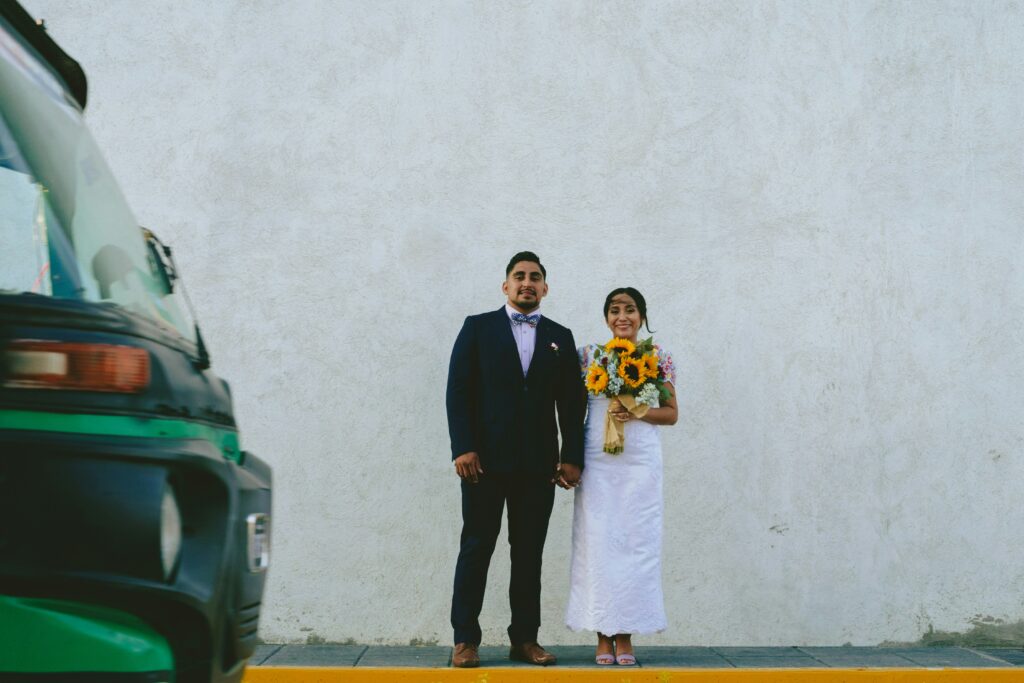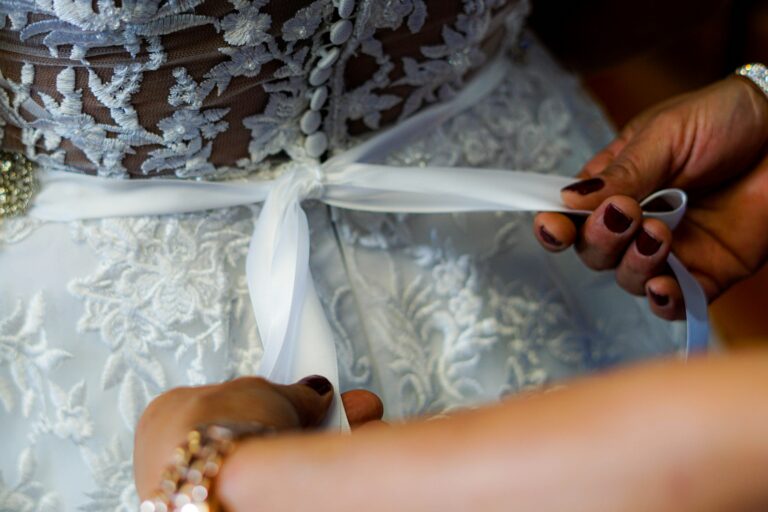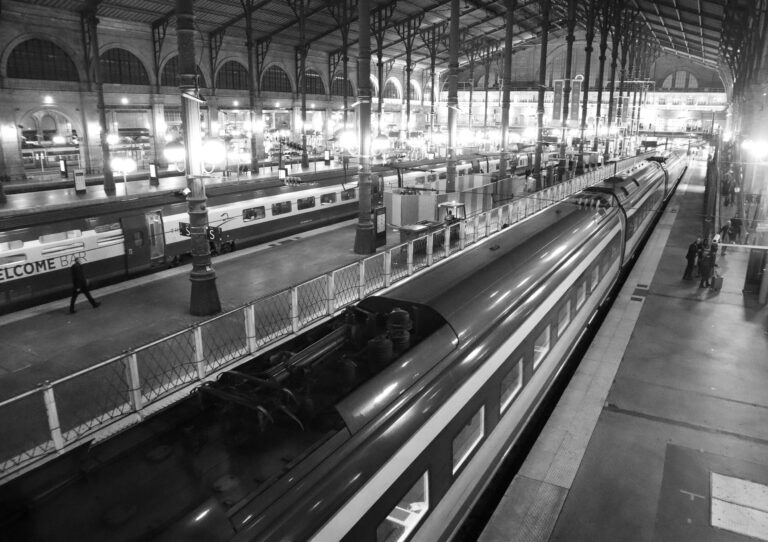In the era of environmental consciousness, more couples are choosing to express their love for each other and the planet by planning a zero-waste wedding ceremony and reception. For those uninitiated, zero waste is a lifestyle that aims to significantly reduce, and ideally eliminate, the amount of trash one produces. This can be a challenging task, but not impossible. Here, we will delve into how you can host a sustainable wedding that aligns with your eco-friendly values without compromising on the elegance and grandeur of your special day.

The push for sustainability has extended into the realm of weddings, a significant occasion traditionally characterized by excess. From single-use decor to extravagant meals that result in heaps of leftovers, it’s no secret that weddings can be a major source of waste. However, with careful planning and thoughtful decision-making, you can reduce your wedding’s environmental footprint and still create a beautiful and memorable day.
This post is designed to be your comprehensive guide to planning a zero-waste wedding ceremony and reception. We’ll cover everything from choosing an eco-friendly venue and sustainable wedding attire to selecting waste-free food and beverage options and eco-friendly decor. So, whether you’re at the beginning of your wedding planning journey or already in the midst of it, there’s something here for you.
Moreover, we’ll share tips on how to communicate your eco-friendly wedding intentions to your guests in a way that is respectful and inclusive. We’ll also provide practical advice for dealing with inevitable waste in an environmentally responsible manner. So, prepare to say ‘I do’ to sustainability and plan an unforgettable zero-waste wedding that truly represents your commitment to each other and the planet. 🌍💍🌿
Understanding Venue Impact on Sustainability
The environmental impact of a wedding venue extends beyond its physical location. It encompasses the energy required to power the event, the transportation involved for both vendors and guests, and the infrastructure available for waste management. A thoughtfully chosen venue can dramatically reduce a wedding’s ecological footprint, setting the tone for a celebration that values sustainability as much as love and community.
Venues that already implement green policies are invaluable assets. Look for places that have LEED certification, participate in green building initiatives, or actively promote sustainable event hosting. These venues often take steps such as installing low-flow toilets, maintaining green roofs, or using environmentally safe cleaning products, contributing to a more sustainable experience from start to finish.
Questions to Ask Potential Venues
When touring and evaluating venues, couples committed to sustainability should feel empowered to ask specific questions that go beyond aesthetics and capacity. Consider these examples:
- Do you use renewable energy sources like solar or wind?
- What is your policy on waste reduction and recycling?
- Do you provide composting bins or work with a composting service?
- Can we use biodegradable confetti, or are there restrictions?
- Are local, organic, or plant-based menu options available through your catering services?
- Do you allow external vendors who follow zero-waste practices?
- Are there accommodations on-site to reduce transportation needs for guests?
Asking these questions during the venue selection process can help identify which locations are authentically aligned with your sustainability goals and which are simply using “green” as a marketing buzzword.
Transportation and Accessibility Considerations
Transportation is one of the largest contributors to carbon emissions in any event. To minimize your impact, choose a venue that is easy to reach via public transportation or shuttle service. Better yet, consider a venue where both the ceremony and reception can be held in the same location to reduce travel between sites.
Some couples also opt to host “destination” eco-weddings where guests can stay on-site or within walking distance. This not only makes the event more convenient for attendees but also significantly reduces transportation emissions.
Encouraging guests to carpool or use shared ride services is another simple way to reduce the carbon footprint of your big day. Include clear travel details and eco-friendly transportation suggestions in your digital invitation or wedding website to make it easy for guests to make sustainable choices.
Indoor vs. Outdoor Sustainable Wedding Venues
Outdoor venues such as botanical gardens, vineyards, farms, and beachfronts offer a natural ambiance that often reduces the need for elaborate decorations. When nature provides the backdrop, there’s less need to buy, rent, or craft additional design elements. However, it’s important to verify that these outdoor locations follow sustainable land stewardship practices.
Indoor venues can be just as eco-conscious. Historic buildings, museums, art galleries, or green-certified event halls can all serve as beautiful and environmentally responsible wedding spaces. Many of these buildings are repurposed or renovated, offering character and charm without the need for new construction.
Partnering with Green Vendors
A venue’s sustainability often extends to the vendors they work with. Ask if they have a preferred vendor list that includes eco-conscious options. These might include caterers who use organic produce, florists who source locally and seasonally, or rental companies that use biodegradable tableware.
If you’re bringing in your own vendors, be sure to communicate your zero-waste goals clearly. Seek out photographers who use digital galleries instead of printed proofs, DJs who use energy-efficient equipment, and planners who specialize in low-waste events. Collaboration is key—working with like-minded professionals will make your journey smoother and your event more meaningful.
Maximizing the Natural Environment
Choosing a venue that already incorporates natural beauty into its design can help minimize the need for extensive décor and lighting. Spaces with plenty of daylight, scenic outdoor views, and organic textures reduce the need for artificial enhancements.
When the surroundings are naturally stunning, such as a woodland grove or lakeside lodge, a minimalist design approach often feels more authentic. Add to that eco-friendly elements like reusable flower arrangements or potted plants, and your venue becomes a living extension of your values.
Waste Management Practices
Even with the most sustainable intentions, weddings generate waste. The difference lies in how that waste is handled. A sustainable venue will have clear protocols in place to manage post-event cleanup in an environmentally responsible way.
Ensure your venue provides labeled bins for compost, recycling, and landfill. Work with your planner to assign a waste coordinator or team of volunteers to monitor disposal stations throughout the event. Choose vendors who agree to reduce packaging or reuse materials, and be intentional about how leftovers are managed, whether that’s through donation or composting.
For example, some venues partner with local shelters or food banks to redistribute unserved meals. Others may have composting programs that allow food scraps and biodegradable materials to return to the earth instead of the landfill.
Green Energy and Resource Efficiency
One of the most impactful features of a sustainable venue is its use of renewable energy. Ask whether the location is powered by solar, wind, or hydroelectric sources. Inquire about energy-efficient lighting systems, smart climate control, and eco-conscious water management (such as graywater recycling or drought-resistant landscaping).
If the venue doesn’t currently use green energy, ask if it’s possible to offset your energy use through renewable energy certificates (RECs) or carbon offsets. Many green wedding planners can help calculate your event’s energy use and guide you through this process.
Supporting the Local Economy and Biodiversity
Choosing a sustainable venue also means supporting local ecosystems and communities. Venues that work with local artisans, farmers, and businesses contribute positively to the region’s economy. Look for wedding packages that incorporate community-sourced elements—such as locally brewed beverages, handmade décor, or regional floral arrangements.
Additionally, avoid venues that may negatively impact fragile ecosystems. Events held in national parks, beaches, or protected habitats should follow strict Leave No Trace policies. Be mindful of wildlife, native plants, and noise levels when planning outdoor events.
Venue-Specific Examples of Green Practices
To better understand what sustainability looks like in action, here are a few examples of practices that forward-thinking venues may implement:
- Solar-powered lighting throughout the event space and parking lots
- Rainwater harvesting systems for irrigation
- Locally crafted furniture made from reclaimed wood
- Repurposed barns or industrial spaces converted into wedding venues
- Compostable restroom products and refillable soap dispensers
- On-site gardens used to grow herbs and flowers for weddings
- “Green roofs” that help regulate indoor temperatures and reduce stormwater runoff
Seeing these features firsthand can help you determine whether a venue is truly committed to sustainability or simply engaging in greenwashing.
Planning for Seasonal and Weather Considerations
While outdoor venues offer incredible beauty and a natural ambiance, they do require additional planning to ensure guest comfort and waste minimization. If you’re choosing an outdoor space, opt for a season with mild weather to avoid energy-hungry climate control systems like heaters or fans.
Provide eco-friendly amenities for guests, such as reusable water bottles, bamboo hand fans, or natural fiber blankets. If tents or canopies are needed, rent them instead of buying, and look for vendors who offer biodegradable or recyclable options.
Make sure your contingency plan (in case of rain or extreme weather) doesn’t compromise your sustainability goals. Talk to your venue and planner about alternatives that keep waste to a minimum.
Opting for Eco-Friendly Invitations
The next step is to send out your wedding invitations. Traditional wedding invitations often involve a great deal of paper and plastic, not to mention the carbon emissions associated with their delivery.
Digital Invitations
One option is to use digital invitations, which require no physical materials or transportation. There are numerous online platforms available that allow you to design beautiful, personalized digital invitations. Furthermore, digital invitations enable guests to RSVP online, thus further reducing waste.
Plantable Invitations
Another option is to use plantable invitations, which are made from biodegradable paper embedded with seeds. Once the wedding is over, guests can plant the invitation in their garden, where it will grow into flowers or herbs.
Sustainable Catering
Food and drink are a significant part of any wedding, and they present a fantastic opportunity to further your commitment to sustainability.
Locally Sourced, Organic Menu
By choosing a caterer who specializes in locally sourced, organic food, you can ensure that your wedding meal is both delicious and eco-friendly. Local sourcing reduces carbon emissions, while organic farming practices protect the health of the soil and the biodiversity of the ecosystem.
Compostable Dinnerware
Compostable dinnerware is another great option. Made from natural materials such as palm leaves or bamboo, these plates and cutlery can be composted after use, returning valuable nutrients to the soil.
Sustainable Decorations
Decorations set the mood for your wedding, but they can also generate a lot of waste. Fortunately, there are many eco-friendly alternatives available.
Rent Instead of Buying
Renting decorations is a great way to reduce waste. Many companies specialize in wedding rentals and offer a wide range of items, from tables and chairs to linens and centerpieces. After the wedding, these items can be returned and reused.
Use Natural Materials
Using decorations made from natural materials is another great way to minimize waste. For example, centerpieces can be made from fresh flowers or potted plants, which can be composted or replanted after the wedding.
Zero-Waste Wedding Favors

Wedding favors are a traditional way to thank your guests for attending. However, they often end up in the trash. To avoid this, consider giving your guests zero-waste wedding favors.
Edible Favors
Edible favors are a great option. You could give each guest a jar of local honey, a bag of organic coffee, or a box of homemade cookies. These are not only delightful gifts, but also generate minimal waste.
Plantable Favors
Another idea is to give your guests plantable favors, such as seed bombs or small potted plants. These can be taken home and grown, providing a lasting reminder of your special day.
Sustainable Wedding Attire
Lastly, consider the sustainability of your wedding attire. The wedding fashion industry is notorious for its environmental impact, but there are plenty of eco-friendly alternatives.
Rent or Buy Secondhand
Renting or buying secondhand are both great options. There are many online platforms that allow you to rent or buy pre-loved wedding dresses and suits. This not only saves you money, but also reduces the demand for new garments and the associated environmental impact.
Choose Sustainable Materials
If you do choose to buy new, look for garments made from sustainable materials. Organic cotton, hemp, and bamboo are all excellent choices. Additionally, some designers offer wedding dresses and suits made from recycled materials.
- Choose a sustainable venue that uses renewable energy sources and has recycling and composting facilities.
- Opt for digital or plantable invitations to reduce waste.
- Choose a caterer who specializes in locally sourced, organic food, and use compostable dinnerware.
- Rent decorations and choose items made from natural materials.
- Give your guests zero-waste wedding favors, such as edible or plantable items.
- Consider renting or buying secondhand wedding attire, or choose garments made from sustainable materials.
Remember, planning a zero-waste wedding is not only about making environmentally friendly choices, but also about creating a beautiful and meaningful celebration of love. By incorporating sustainability into your wedding, you can start your married life together with a commitment to protecting the planet.
Conclusion
In conclusion, planning a zero-waste wedding ceremony and reception is not only a testament to your commitment to each other, but also to the environment. The steps outlined in “Say ‘I Do’ to Sustainability” provide an easy-to-follow guide for those who want their special day to reflect their dedication to sustainability. This includes selecting eco-friendly invitations, choosing a sustainable venue, hiring vendors committed to zero waste, and incorporating repurposed or recycled decor. Also, suggesting earth-friendly options for gifts is a wonderful way to encourage sustainable practices among your guests. Indeed, such an event does not compromise on style or quality; rather it showcases thoughtfulness, creativity and authenticity. The zero-waste wedding is a growing trend, perfectly aligning love and environmental consciousness in a beautiful union. As we have seen, this can be achieved with careful planning, ensuring that your wedding day is not only memorable but also leaves a positive impact. So, let’s say ‘I Do’ to sustainability, making our planet as enduring as our vows. Remember, each small step towards sustainability contributes to a larger change. Your wedding could be the next inspiring step in that journey.



